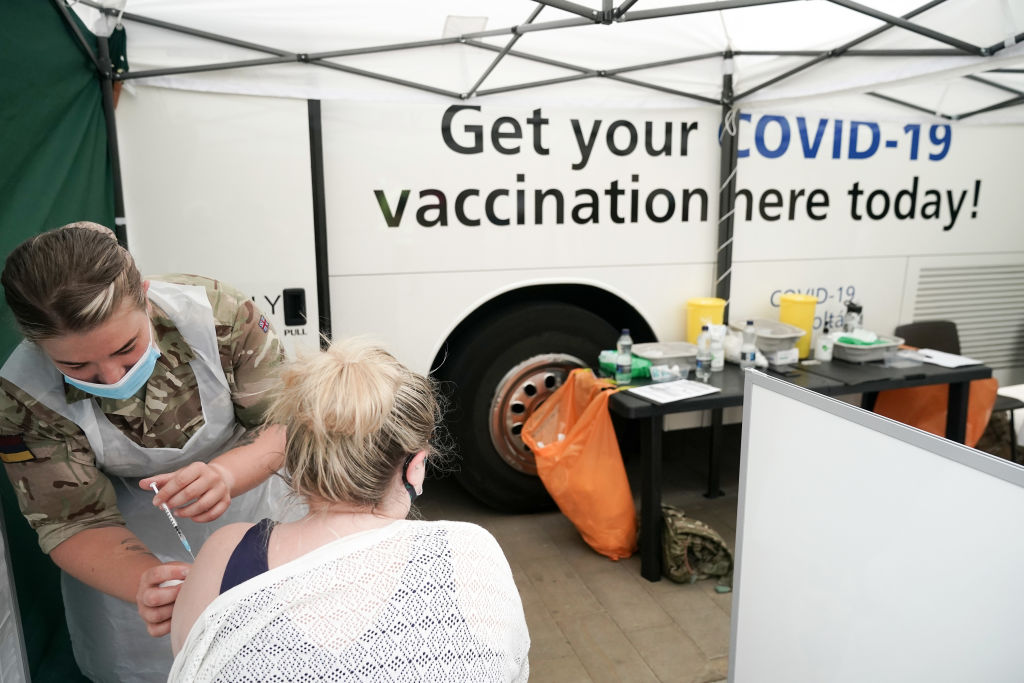COVID-19 vaccines reduce hospitalization risk from Delta variant by at least 90 percent, U.K. studies find


A free daily email with the biggest news stories of the day – and the best features from TheWeek.com
You are now subscribed
Your newsletter sign-up was successful
Public health officials are worried about the Delta variant of the COVID-19 coronavirus, but two U.K. studies published Monday found that two doses of leading vaccines offer "very, very substantial" protection against the new, highly transmissible strain, Aziz Sheikh, director of the University of Edinburgh's Usher Institute and lead author of one of the two studies, tells The Wall Street Journal.
One analysis by Public Health England of more than 14,000 Delta infections found that two doses of the Pfizer/BioNTech vaccine reduced the risk of hospitalization by 96 percent, while a double dose of the Oxford-AstraZeneca vaccine lowered the risk by 92 percent. The second study, published as a letter in The Lancet by academics and public health experts in Scotland, found that two doses of either vaccine reduced hospitalization from the Delta variant by 70 percent and offered robust but slightly diminished protection against infection.
The Delta variant, first seen in India, is now the dominant strain in Britain, accounting for 90 percent of new cases. Compared with previous variants, the Delta mutation appears significantly more likely to infect people who have only received one dose of the two-shot vaccines. The U.K.'s initial vaccination strategy involved getting one jab into as many arms as possible before focusing on second doses. "We've got an opportunity to counter the threat of this Delta variant by encouraging uptake of both doses of the vaccine," Jim McMenamin, national incident director for COVID-19 at Public Health Scotland, told reporters Monday.
The Week
Escape your echo chamber. Get the facts behind the news, plus analysis from multiple perspectives.

Sign up for The Week's Free Newsletters
From our morning news briefing to a weekly Good News Newsletter, get the best of The Week delivered directly to your inbox.
From our morning news briefing to a weekly Good News Newsletter, get the best of The Week delivered directly to your inbox.
A free daily email with the biggest news stories of the day – and the best features from TheWeek.com
Peter has worked as a news and culture writer and editor at The Week since the site's launch in 2008. He covers politics, world affairs, religion and cultural currents. His journalism career began as a copy editor at a financial newswire and has included editorial positions at The New York Times Magazine, Facts on File, and Oregon State University.
-
 Political cartoons for February 19
Political cartoons for February 19Cartoons Thursday’s political cartoons include a suspicious package, a piece of the cake, and more
-
 The Gallivant: style and charm steps from Camber Sands
The Gallivant: style and charm steps from Camber SandsThe Week Recommends Nestled behind the dunes, this luxury hotel is a great place to hunker down and get cosy
-
 The President’s Cake: ‘sweet tragedy’ about a little girl on a baking mission in Iraq
The President’s Cake: ‘sweet tragedy’ about a little girl on a baking mission in IraqThe Week Recommends Charming debut from Hasan Hadi is filled with ‘vivid characters’
-
 A Nipah virus outbreak in India has brought back Covid-era surveillance
A Nipah virus outbreak in India has brought back Covid-era surveillanceUnder the radar The disease can spread through animals and humans
-
 Trump HHS slashes advised child vaccinations
Trump HHS slashes advised child vaccinationsSpeed Read In a widely condemned move, the CDC will now recommend that children get vaccinated against 11 communicable diseases, not 17
-
 Covid-19 mRNA vaccines could help fight cancer
Covid-19 mRNA vaccines could help fight cancerUnder the radar They boost the immune system
-
 FDA OKs generic abortion pill, riling the right
FDA OKs generic abortion pill, riling the rightSpeed Read The drug in question is a generic version of mifepristone, used to carry out two-thirds of US abortions
-
 The new Stratus Covid strain – and why it’s on the rise
The new Stratus Covid strain – and why it’s on the riseThe Explainer ‘No evidence’ new variant is more dangerous or that vaccines won’t work against it, say UK health experts
-
 RFK Jr. vaccine panel advises restricting MMRV shot
RFK Jr. vaccine panel advises restricting MMRV shotSpeed Read The committee voted to restrict access to a childhood vaccine against chickenpox
-
 Texas declares end to measles outbreak
Texas declares end to measles outbreakSpeed Read The vaccine-preventable disease is still spreading in neighboring states, Mexico and Canada
-
 RFK Jr. shuts down mRNA vaccine funding at agency
RFK Jr. shuts down mRNA vaccine funding at agencySpeed Read The decision canceled or modified 22 projects, primarily for work on vaccines and therapeutics for respiratory viruses
